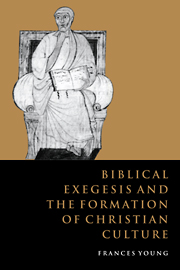Book contents
- Frontmatter
- Contents
- Preface
- List of abbreviations
- Introduction
- PART I EXEGESIS AND THE UNITY OF THE SCRIPTURES
- PART II THE BIBLE AS CLASSIC
- PART III LANGUAGE AND REFERENCE
- 6 Reference and cross-reference
- 7 The sacrament of language
- 8 Allēgoria and theōria
- 9 The question of method
- PART IV THE BIBLE AND THE LIFE OF FAITH
- Conclusion and retrospect: towards an outline historical account
- Bibliography
- 1 Index ofbiblicaI references
- 2 Index of modern scholars
- 3 Index of subjects
9 - The question of method
Published online by Cambridge University Press: 02 December 2009
- Frontmatter
- Contents
- Preface
- List of abbreviations
- Introduction
- PART I EXEGESIS AND THE UNITY OF THE SCRIPTURES
- PART II THE BIBLE AS CLASSIC
- PART III LANGUAGE AND REFERENCE
- 6 Reference and cross-reference
- 7 The sacrament of language
- 8 Allēgoria and theōria
- 9 The question of method
- PART IV THE BIBLE AND THE LIFE OF FAITH
- Conclusion and retrospect: towards an outline historical account
- Bibliography
- 1 Index ofbiblicaI references
- 2 Index of modern scholars
- 3 Index of subjects
Summary
The discussion so far, especially in Part III, surely raises some questions for standard accounts of patristic exegetical method. It is time we took stock and faced the implications.
Patristic method is commonly characterised in terms of ‘literal’, ‘typological’ and ‘allegorical’ exegesis, the Fathers being understood as the precursors of the mediaeval fourfold sense. Simonetti, for example, tends to work with two senses, material and spiritual, but subdivides the latter into moral and typological. This threefold division, found he thinks in Origen, is then developed into a fourfold pattern by John Cassian. Debate in the fourth century between the two great schools of Antioch and Alexandria is generally taken to focus on the merits of the ‘literal’ and ‘allegorical’ approaches, the ‘literal’ usually being equated with the ‘historical’. Some of the great exegetes, like the Cappadocians, Jerome and Cyril of Alexandria, since they do not fit into these categories, are described as ‘eclectic’ in their method. But not one of these conventional terms is univocal. A review of each will highlight the problems of treating them as methodological categories.
Literal meanings
The assumption that we know what ‘literal’ means conceals different usages, with different weightings in our world from the world of the Fathers. For us, ‘literal’ may mean the ‘plain sense’ of the words, taking full account of context and including metaphors such as ‘God is my Rock’; by contrast the Fathers distinguished wording from sense, and the normal sense of a word from its use as a metaphor, so that they would argue that ‘God is my Rock’ is an absurdity ‘according to the letter’, and so one must take it tropikōs, that is, metaphorically or tropologically
- Type
- Chapter
- Information
- Biblical Exegesis and the Formation of Christian Culture , pp. 186 - 214Publisher: Cambridge University PressPrint publication year: 1997



